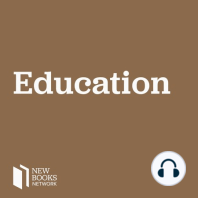24 min listen

Stanley S. Litow and Tina Kelley, "Breaking Barriers: How P-Tech Schools Create a Pathway from High School to College to Career" (Teachers College Pre…
Stanley S. Litow and Tina Kelley, "Breaking Barriers: How P-Tech Schools Create a Pathway from High School to College to Career" (Teachers College Pre…
ratings:
Length:
46 minutes
Released:
Sep 27, 2021
Format:
Podcast episode
Description
What is the purpose of education? Folks outside the field are likely to think of a relatively clear or concrete answer—learning, citizenship, preparation for life, which for the vast majority encompasses work and skills. Upon probing, however, most are likely to realize that these explanations are deceptively simple. Learning what, how, and according to which or whose values? Citizenship within what communities, through which policies and enacted with how much equity, not to mention care? Why are we preparing certain kids for certain kinds of work, especially if laboring in certain ways will not necessarily earn material dignity or social capital?
Consensus on the purpose of education has perhaps always been elusive, and maybe it is now most of all. So I appreciate when authors in the education space disclose their perspectives on this perennial and critical question. In Breaking Barriers: How P-TECH Schools Create a Pathway from High School to College to Career, Stanley S. Litow and Tina Kelley are quite forthright on this matter: “Public education is the lifeblood of our democracy. If our schools fail, our economy fails. Our students’ achievement is eventually connected to every issue of consequence our country will face, including racial justice, public health, closing the digital divide, income inequality, and economic empowerment” (p. 170). The authors position P-TECH schools as more than a scalable model working towards “fairer” public schools; they argue for P-TECH as a reform movement that centers students within a coalition of education stakeholders. Ultimately, they show that “education stakeholders” is a category encompassing literally everyone.
Christina Anderson Bosch is faculty at the California State University, Fresno. She is curious about + committed to public, inclusive education in pluralistic societies where critical perspectives on questions of social and ecological justice are valued enough to enact material dignity and metaphysical wellbeing on massive scales.
Learn more about your ad choices. Visit megaphone.fm/adchoices
Support our show by becoming a premium member! https://newbooksnetwork.supportingcast.fm/education
Consensus on the purpose of education has perhaps always been elusive, and maybe it is now most of all. So I appreciate when authors in the education space disclose their perspectives on this perennial and critical question. In Breaking Barriers: How P-TECH Schools Create a Pathway from High School to College to Career, Stanley S. Litow and Tina Kelley are quite forthright on this matter: “Public education is the lifeblood of our democracy. If our schools fail, our economy fails. Our students’ achievement is eventually connected to every issue of consequence our country will face, including racial justice, public health, closing the digital divide, income inequality, and economic empowerment” (p. 170). The authors position P-TECH schools as more than a scalable model working towards “fairer” public schools; they argue for P-TECH as a reform movement that centers students within a coalition of education stakeholders. Ultimately, they show that “education stakeholders” is a category encompassing literally everyone.
Christina Anderson Bosch is faculty at the California State University, Fresno. She is curious about + committed to public, inclusive education in pluralistic societies where critical perspectives on questions of social and ecological justice are valued enough to enact material dignity and metaphysical wellbeing on massive scales.
Learn more about your ad choices. Visit megaphone.fm/adchoices
Support our show by becoming a premium member! https://newbooksnetwork.supportingcast.fm/education
Released:
Sep 27, 2021
Format:
Podcast episode
Titles in the series (100)
Christopher Tienken and Donald Orlich, “The School Reform Landscape: Fraud, Myth, and Lies” (Rowman and Littlefield, 2013): Christopher Tienken and Donald Orlich are authors of the provocative new book, The School Reform Landscape: Fraud, Myth, and Lies (Rowman and Littlefield 2013). Dr. Tienken is an assistant professor in the College of Education and Human Services at Set... by New Books in Education